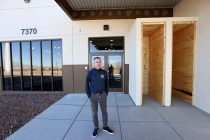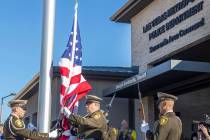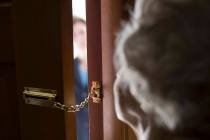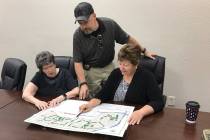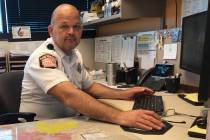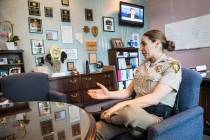Residents encouraged to keep disaster plans and preparedness kits at the ready
“Think about it, what would happen if your electricity, gas, water — even the ability to make a phone call — were stopped for any length of time, say for three days, or maybe even a week? Suppose you can’t get to the grocery store, and even if you could, you would find that it’s not open?”
Those questions were raised by Ward 4 Las Vegas City Councilman and Mayor Pro Tem Stavros Anthony during an interview.
Anthony said the most likely reasons for causing such stoppages would be attributed a man-made or natural disaster. It could be an earthquake or an out-of-control fire, such as the one that devastated considerable areas of Mount Charleston last summer. Or it might be a terrorist attack, a nuclear explosion or a hazardous waste spill.
“These are serious questions pertaining to the potential for serious disasters — a potential that always exists,” Anthony added.
The Southern Nevada Health District has for several years been in the forefront of urging families to seriously prepare a “disaster plan.” Paramount among such preparations would be creating an emergency kit of basic necessities, beginning with ample nonperishable food and drinking water.
“Anticipate man-made and natural disasters,” the health district says on its website, snhd.info. “Learn about your community’s warning signals.”
In addition to creating an emergency kit for your family, the health district urges that you “find out about the disaster plans at your workplace, your children’s school or day care center and other places where your family spends time.”
Anthony and other city officials are fearful that the public tends to become indifferent to the potential for a disaster — until it hits. The 9/11 terrorist attacks are a perfect example of how a catastrophe can strike with suddenness and devastating force.
The chances of an earthquake, terrorist attack or some other potentially major disaster happening have become increasingly realistic, especially in an unstable and unpredictable world. If it should occur, not only might basic necessities become unavailable, but in an attempt to obtain such needs folks could find that roads would be unusable. Even gas stations would be closed.
Anthony put the potential for such a happening to the test.
“Are you prepared for such an occurrence until the necessary repairs are made?” he asked. “Remember, under such circumstances neither the police, nor fire and emergency, nor anyone else might be in a position to help you, nor provide you and your family with basic necessities until the overall problem has been sufficiently resolved.”
And those necessities are more basic than some folks may realize. They include stockpiles of canned and other nonperishable food, sufficient drinking water, flashlights, a portable radio, extra batteries, a first-aid kit, prescription medications, adequate clothing, food and other supplies for pets, copies of important documents and even an ample supply of cash.
“If you’re not adequately prepared for such an emergency, what then?” asked Anthony as he referred to his semiannual reminder to constituents to “take stock of your emergency stockpiles.”
Assembling an emergency stockpile of necessities is something that may take some doing, but in case of a disaster the implementation of such a plan could be life-saving, Anthony explained.
“I encourage all Las Vegans, not just constituents in my ward, to stay prepared in case of a major catastrophe,” he said.
In talking about the effects of such a disaster, he emphasized that it would be likely to strain public resources to the limit, leaving little or no ability to provide assistance to individuals.
“That means you could be on your own for days, maybe even a week. You and your family would have to fend for yourselves,” he said. “An emergency preparedness kit is a first step to ensure that families and businesses can sustain themselves in the event of a disaster.”
He suggested that “family emergency supplies could be contained in a new, large trashcan or a sizable suitcase. It can be assembled over several months by adding just one or two items to a grocery list.”
Ideally, he said such a kit “should include enough supplies to sustain everyone in the household for up to three weeks.”
Herb Jaffe was an op-ed columnist and investigative reporter for most of his 39 years at the Star-Ledger of Newark, N.J. His most recent novel, “Double Play,” is now available. Contact him at hjaffe@cox.net.








